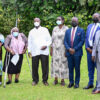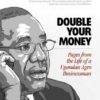Columnists
Why oil might turn Uganda into a Libya
Mr President, don’t dismiss some dreams especially nightmares that paint a Uganda in the image of Libya!
Four years ago, and I wrote in these very pages a piece that revealed why the donor community — the historical friends of Uganda, especially under the NRM government — held back funds that throughout the 1990s and early 2000s contributed the biggest half of Uganda’s national budget.
In that piece, I indicated how bilateral and multilateral donors had, on the advice of the World Bank, come to resolve to cut ODA (official development assistance) extended to Uganda because, “Uganda is facing a period of rising political uncertainty…”
A few years earlier, the World Bank had commissioned a secret investigation into the political economy of Uganda with a view of assessing the level of risk it posed for the Bank’s lending program in the country.
The “Confidential Report” entitled, “The Political Economy of Uganda: The art of Managing a Donor-financed Neo-Patrimonial State” tells it all why donors reduced funding extended to our country.
The recommendations of the 75-page report were explicit. “Uganda is facing a period of rising political uncertainty…Extreme prudence (on the side of the World Bank) is required,” reads the first statement of the conclusions of the report.
The report went ahead to recommend thus, “First, the Bank should plan for the possibility of a ‘low case’ lending program in Uganda during the period of the forthcoming Country Assistance Strategy (CAS).
“Second, the Bank and other donors must rethink the appropriateness of continued budget support, and especially, the appropriateness of increasing budget support. Since the Bank cannot weigh in explicitly on Uganda’s political process, this is the only mechanism at its disposal to signal its concern.”
Mr President, like I told you then, the World Bank report accused your government of diverting donor funds meant for socio-economic development into the so-called classified budgets and then use the money for political purposes.
The report asserts, “…a fundamental characteristic of Uganda’s political system was, and remains, that President Museveni is the Movement and the Movement is Museveni.” And that your government depends increasingly on the distribution of patronage using donor funds to operate and survive. “This in turn explains the rising corruption in Uganda, and the apparent inability or unwillingness of President Museveni to bring corruption under control.”
The report views corruption in Uganda as fundamentally a political phenomenon (not merely a criminal phenomenon), “a mechanism for regime maintenance.” It further asserts that corruption in Uganda ranges from petty rent-seeking to multi-million dollar scams, dispensed to loyal followers of the regime, notably “several close associates and family members of the President including his brother, son, brother-in-law and other relatives.”
The four authors of the report including one Ugandan professor at Makerere University suggested to the World Bank that continued flow of donor funds to Uganda would culminate into “financing of opaquely administered accounts—in essence ‘slush funds’—that can be tapped for political purposes, in addition to military ones, as the needs arise.” And that such accounts will be indirectly, though unintentionally, donor financed.
They further contended that with unchecked flow of donor funding, the World Bank may become indirectly involved in Uganda’s political process notwithstanding the fact that this is beyond its mandate.
The report highlighted the usual indictments of your rule, Mr President. From repealing Article 105(2) that gave you an open ticket to the presidency, to rising corruption (as a form of patronage) and personal rule since 1996, to your increased involvement in the election process, to your verbal abuse of political opponents and donor community, the authors of the report suggest that “the achievements of the first decade of the Museveni regime have been steadily eroded…”
One unnamed former senior official of the Movement — whom I guess is your childhood friend Eria Kategaya (he is among the interviewees listed in the report) — told the authors, “There is little likelihood that Museveni of 1986 and the Museveni of 2004 would recognise each other; they are two different people.” I remember Kategaya saying a similar statement during his sojourn in FDC!
In short, below are some of the excerpts of the report.
“Although Uganda has maintained and will probably continue to maintain its record of prudent macro-economic policy, the non-macro political requisites for development, i.e. the governance requisites, are in decline.
“Economic growth continues to be high. But evidence from the household surveys shows a reversal in the trend of sustained poverty reduction enjoyed in the previous decade. There has been a marked retreat from expanding the conditions that encourage investment, and which are necessary to maintain Uganda’s high rate of growth. Indeed, the rate of growth has fallen. Whereas the rate of economic growth averaged 7.3 percent between 1988 through 1995, it dropped to 6.3 percent between 1996 through 2000, and to 5.8 percent since then. (And further down to 3.2% today).
“Many Ugandans are becoming poorer while the economic divide between North and South widens — a divide that has exacerbated the historical political divide and vice versa.
“Museveni’s approach to economic and political governance now is a “two level game”, whose contradictions have become more pronounced. On the one side, there is the commitment to reform. On the other, there is the commitment to staying in power no matter what the cost.
“…the press remains relatively free, the broadcast media has opened up, and civil society, including political parties can operate. Equally noteworthy are the independence of the judiciary, and the National Assembly (Parliament). Yet as the experience of elections made clear, there is no real prospect of a change of government via the ballot.
“President Museveni now places a primary emphasis on loyalty rather than on competence…a clique of sycophants has emerged around the President similar to that which surrounded Daniel arap Moi in Kenya in the early 1990s. The similarity with Moi is also apparent with respect to the problem of rising corruption. Several of those closest to the President are among those alleged to have benefited from a range of questionable business deals that would not have been possible were it not for their proximity to the head of state. The group is a mixture of family and friends…
“And for these hangers-on, the primary reason Museveni should continue in office is because they require his protection to keep what they have gained, and accumulate more…Museveni regime uses “classified” line items in the budget for the Office of the President, defense and security organisations to obfuscate expenditures for political purposes.
“In light of these findings, the World Bank’s country team needs to consider the possibility of a “low case” lending program in Uganda. It also needs to rethink the way it approaches budget support, and especially it needs to rethink the desirability of increasing budget support. It would therefore be prudent for the Country Assistance Strategy (CAS) to provide for other options than this form of assistance between now and 2008.”
In conclusion the report avers, “In the course of the sixty plus interviews conducted for this report, we often ended our meetings with the following question: ‘If you were to use the analogy of a traffic light to signal how one should approach Uganda over the next two years, what colour would you say the light is at today?’ The response invariably ran from ‘amber’ to ‘deep orange’ and ‘headed toward red.’ Never was the metaphoric light ‘green’.”
And the authors were glad to state “We therefore suggest that a move or partial move back to closely monitored project lending, is the most effective way for the World Bank to ensure that its support for programs addressed to poverty alleviation and public sector reform move forward (or maintain their present levels) in what is likely to be an increasingly difficult environment over the next two to three years.”
Mr President, the reason I recited this report, I recently also landed on a similar report, this time by the US Treasury, assessing the political and economic environment in Libya prior to the Arab Spring that kicked Col. Gadaffi not only out of power but also out of existence. What elicited all ounces of fear out of me is the fact that the content of both reports is nothing by a plagiarized script. That’s I my damn feeling is that now that we also have oil, don’t dismiss some dreams especially nightmares that paint a Uganda in the image of Libya.
Comments














